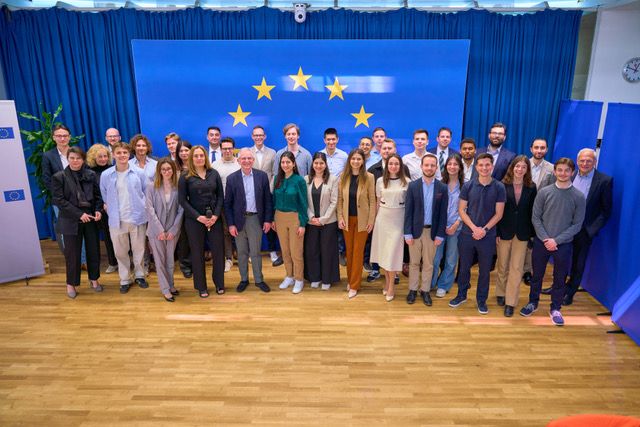On 30th April, United Europe’s Young Leaders Advocacy Seminar took place in partnership with the Representation of the European Commission in Austria. 30 Young Leaders from across the European continent were hosted in the House of the European Union in Vienna and discussed what’s next for Europe after a decisive election year in 2024.
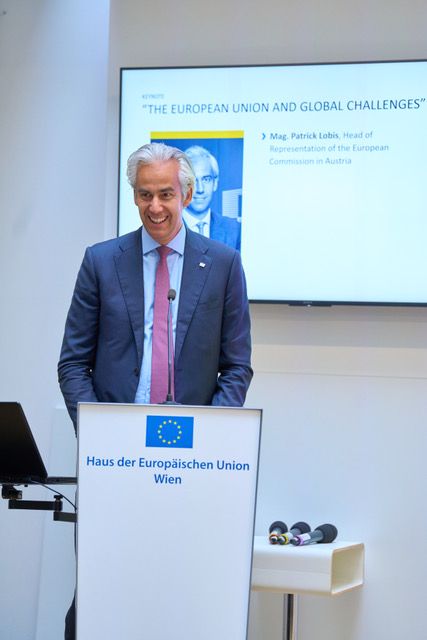
Keynote by Patrick Lobis, Head of Representation at the European Commission in Austria: “The European Union and Global Challenges”
Patrick Lobis emphasized during his keynote, the importance of listening to the perspective of Young Europeans to better inform the political process in Brussels. He encouraged young leaders to voice their opinions, as dialogue is essential, especially in turbulent times where the rule-based international order is under threat.
Europe is facing a dramatic transformation of its economic and geopolitical model. The old approach – importing security from the US and cheap energy from Russia, and cheap labor from China while exporting high-quality goods and services – is no longer sustainable. The Russian threat marks a pivotal moment with no return to the old status quo.
The response must be collective, as no European nation-state can tackle these crises alone. The EU single market remains fragmented, and greater integration is needed, particularly in areas like military procurement, R&D, and technological innovation. Economies of scale are crucial if Europe wants to be rule-maker rather than a rule-taker.
Efforts are underway to reduce bureaucratic burdens to support innovation, especially in tech and green sectors. Regarding EU unity, it is under pressure from external actors and internal populism. Russian propaganda and automated trolls pose significant risks to democracy. Europe must enhance its resilience through both technical solutions and strategic communication.
On the economic front, there is concern about the impact of the US elections and potential trade tensions. The EU opposes tariffs and advocates for diversified trade partnerships, remaining a stable and predictable market. Strengthening the single market remains a top priority to facilitate seamless business across member states.
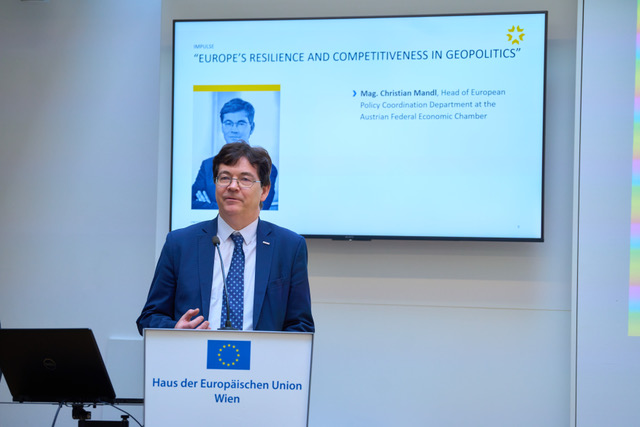
Impulse by Christian Mandl, Head of European Policy Coordination Department at the Austrian Federal Economic Chamber (WKO): “Europe’s Resilience and Competitiveness in Geopolitics”
As geopolitical tensions intensify and economic landscapes evolve, Europe finds itself at a crucial turning point. In his presentation, Christian Mandl, Head of European Policy Coordination at the Austrian Federal Economic Chamber (WKO), outlined the challenges facing Europe’s competitiveness and resilience, and proposed policy directions to secure its future.
The European Union’s Competitive Struggles:
While Europe remains a strong economic force, Mandl warned that its future is uncertain. Asia’s continued rise, especially China’s technological advancement and strategic assertiveness, threatens Europe’ economic position. Countries like Austria and Germany have shown signs of economic stagnation over the past decade. Austria, deeply dependent on Germany (which absorbs 30% of its exports) suffers from economic downturns in its larger neighbor.
Protectionism is also on the rise globally. While the EU remains committed to open markets, it is increasingly vulnerable in a world where the US and China shield their economies. Europe’s dependency on imported raw materials and its soaring energy costs – exacerbated by the shift from pipeline gas to more expensive LNG – put it at a significant disadvantage.
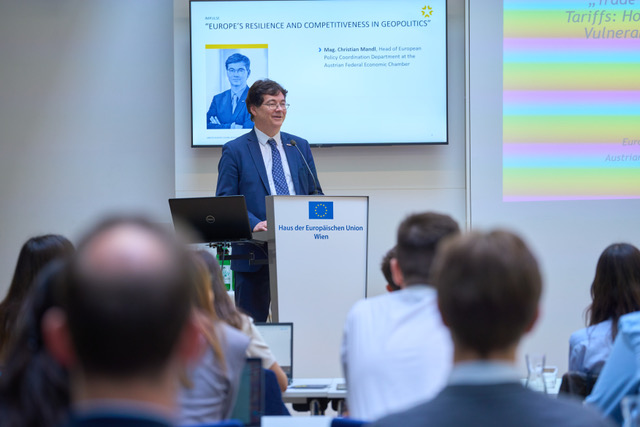
Innovation and Capital: Europe’s Missing Pieces
A critical gap lies in Europe’s fragmented capital market. Startups and tech unicorns often relocate to the US due to easier access to seed and venture capital. Despite being on par with the US in terms of patent output, Europe trails significantly in commercializing innovation. Just 4 of the world’s 50 largest tech companies are European.
Internal Friction: Bureaucracy and Incomplete Integration
Mandl highlighted the paradox of the EU’s internal market – its greatest asset – being incomplete particularly in services. Excessive regulation, especially in sustainability and ESG standards, creates major burdens for businesses. Multiple EU directorates impose overlapping rules, leading to what Mandl called an “ESG Jungle”.
This complexity not only strains EU companies but also alienates international partners. For countries like Indonesia, Europe’s regulatory demands are seen as neo-colonial – imposing European values without offering incentives. This may push such partners towards less restrictive trading alliances.
A New Geopolitical Era
Mandl described a shifting global order, where the world is dividing along geopolitical lines. China’s alliance with Russia poses a strategic challenge to the West. The rise of BRICS+ -now including major energy exporters – signals the emergence of a potential new energy bloc (energy cartel) led by China, undermining the influence of the G7.
Meanwhile, the WTO’s relevance is fading as countries increasingly violate its rules with reciprocal tariffs and trade wars. The US and China’s decoupling is accelerating, with trade rerouted through intermediary countries like Mexico and Vietnam.
The EU’s Response: Reform and Strategic Investment
To address these challenges, the EU has launched initiatives such as the Competitive Compass and the Omnibus package, aiming to reduce bureaucracy, enhance regulatory coherence, and unlock the full potential of the internal market. Simplifying compliance – such as extending reporting intervals for SMEs – could alleviate some off the burdens that currently hinder innovation and growth.
On the Security front, initiatives like ReArm Europe and Readiness 2030 reflect a growing recognition that resilience requires not just economic strength but also military preparedness. However, financing remains a challenge: a quarter of the EU’s future budget is earmarked for paying back debt from the COVID-era Resilience Fund.
CONCLUSION: Europe’s Strategic Dilemma
Mandl’s message was clear: Europe must move faster, become more flexible and focus on completing its internal integration. It must strike a smarter balance between regulation and competitiveness and take concrete steps to strengthen its capital markets and innovation ecosystem.
In a world increasingly shaped by strategic competition and shifting alliances, the EU must define its role – not just as a regulator or a market, but as a geopolitical actor with the agility and unity to shape its own destiny.
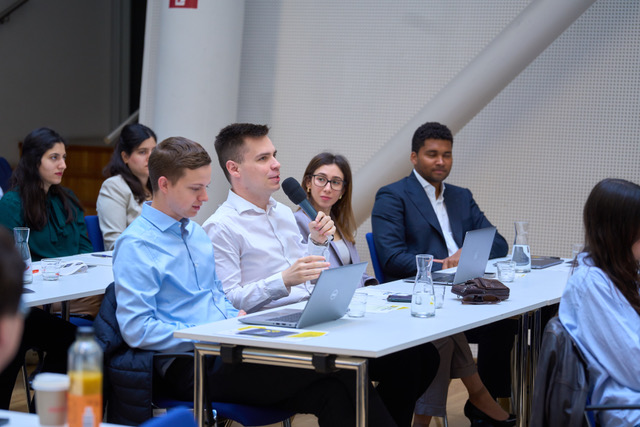
Q&A
“What can Europe do to catch up?”
The United States and China are significantly ahead in many areas. However, there are niche sectors – such as quantum computing – where the EU still has the potential to compete. Europe should focus on its strength rather than attempting to rival global leaders where they already dominate. For instance, Austria’s Zeilinger, exemplifies Europe’s excellence in cutting-edge research. Building on such assets could help position the EU more strategically in the global tech landscape.
“Will defense and trade become more interconnected?”
Yes, this trend has already begun. Security concerns are increasingly linked to trade policies, even without new formal competences granted to the EU. Traditional notions of neutrality no longer suffice in aa world where defense capability underpins geopolitical influence. The UK’s departure from the EU was regrettable, as it – alongside France- was one of the Union’s few members with substantial military power. Without credible defense backing, trade positions lack weight on the global stage. However, it’s unlikely that member states will relinquish sovereignty over defense to the European Union in the near future.
“How can Europe remain open and competitive in the face of protectionism?”
Many countries, such as those in Mercosur, are still eager to pursue mutually beneficial trade agreements. Europe must avoid imposing its values in a way that feels like neo-colonialism. Instead of exporting a rigid value system, the EU should engage in partnerships based on mutual respect and pragmatism. While China will continue to seek deeper economic ties with Europe, such cooperation should be approached with strategic caution.
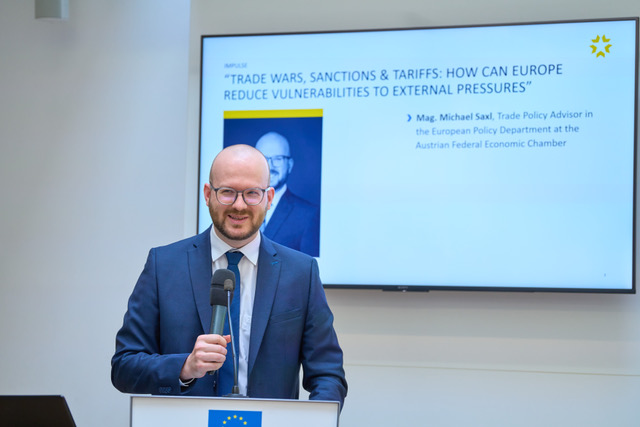
Impulse by Michael Saxl, Trade Policy Advisor at the Austrian Federal Economic Chamber (WKO): “Trade Wars, Sanctions & Tariffs: How can Europe reduce vulnerabilities to external pressures”
What has changed in the U.S. mindset?
The United States is increasingly looking to the past for answers to today’s economic challenges. The U.S. embraced tariffs as a central policy tool to address trade imbalances – particularly its persistent trade deficit.
How is the EU responding?
In contrast, the EU is pursuing a more cooperative approach, seeking to redefine and rebalance transatlantic trade relations through negotiation. While the situation is complex and lacks a single solution, a range of countermeasures is being considered. Some retaliatory, others strategic.
One major counter-strategy involved diversifying trade partnerships, particularly Asia. There is growing momentum behind the idea that the future of EU trade policy lies in stronger ties with Asian economies. India, for example, has shown considerable ambition in trade relations with Europe. However, negotiations remain technically challenging due to differing regulatory frameworks, particularly around the EU’s Carbon Border Adjustment Mechanism (CBAM), deforestation rules, and Trade and Sustainable Development (TSD) chapters, areas where many Asian partners have different priorities.
Progress in EU-Asia Trade Agreements
Despite these challenges, the EU continues to advance trade negotiations across the region. Agreements with Vietnam have already proven successful, generating further interest in EU partnerships. Ongoing negotiations with Thailand and Indonesia look promising. Japan and South Korea serve as strong examples of well-functioning EU-Asia trade relationships, highlighting the potential of such partnerships when aligned on key issues.
The EU-Mercosur Agreement
Meanwhile, the long-anticipated EU Mercosur Free Trade Agreement remains in limbo. The final decision lies with the European Parliament and the Council. Austria currently opposes the agreement, and Italy may become the pivotal voice. As a qualified majority is required, the outcome is uncertain but the decision-making process remains transparent.
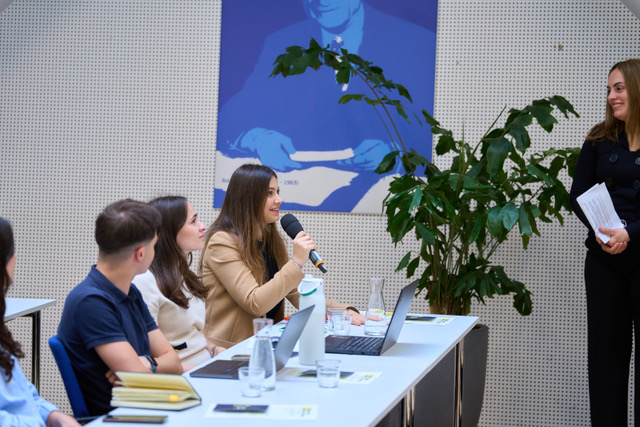 Q&A
Q&A
“Can Europe remain a credible geopolitical actor if it takes 24 months to respond to trade coercion, while others retaliate within 24hrs?”
Clearly nt. In today’s fast-paced geopolitical environment, speed is critical. The EU must become significantly more agile in responding to external pressure. While the Treaty of Lisbon served its purpose when adopted in 2007, the world has changed dramatically. The institutional framework needs to evolve accordingly to enabler quicker, more decisive action on trade and foreign policy matters.
“What challenges lie ahead for candidate countries in terms of economic and industrial transformation?”
The EU has become more cautious about enlargement to 20, 25 years ago. While the long-term political will to expand remains – especially in Brussels – there is a growing preference for a measured, merit-based approach. Austria has traditionally been a strong advocate for EU enlargement, particularly in the Western Balkan. However, some member states now favor a model where all candidate countries join simultaneously, which risks delaying progress. A more pragmatic approach would be to “unbundle” the Western Balkans and allow countries like Albania and Montenegro – who are significantly ahead in their reforms – to join individually, based on their own merit and readiness.



